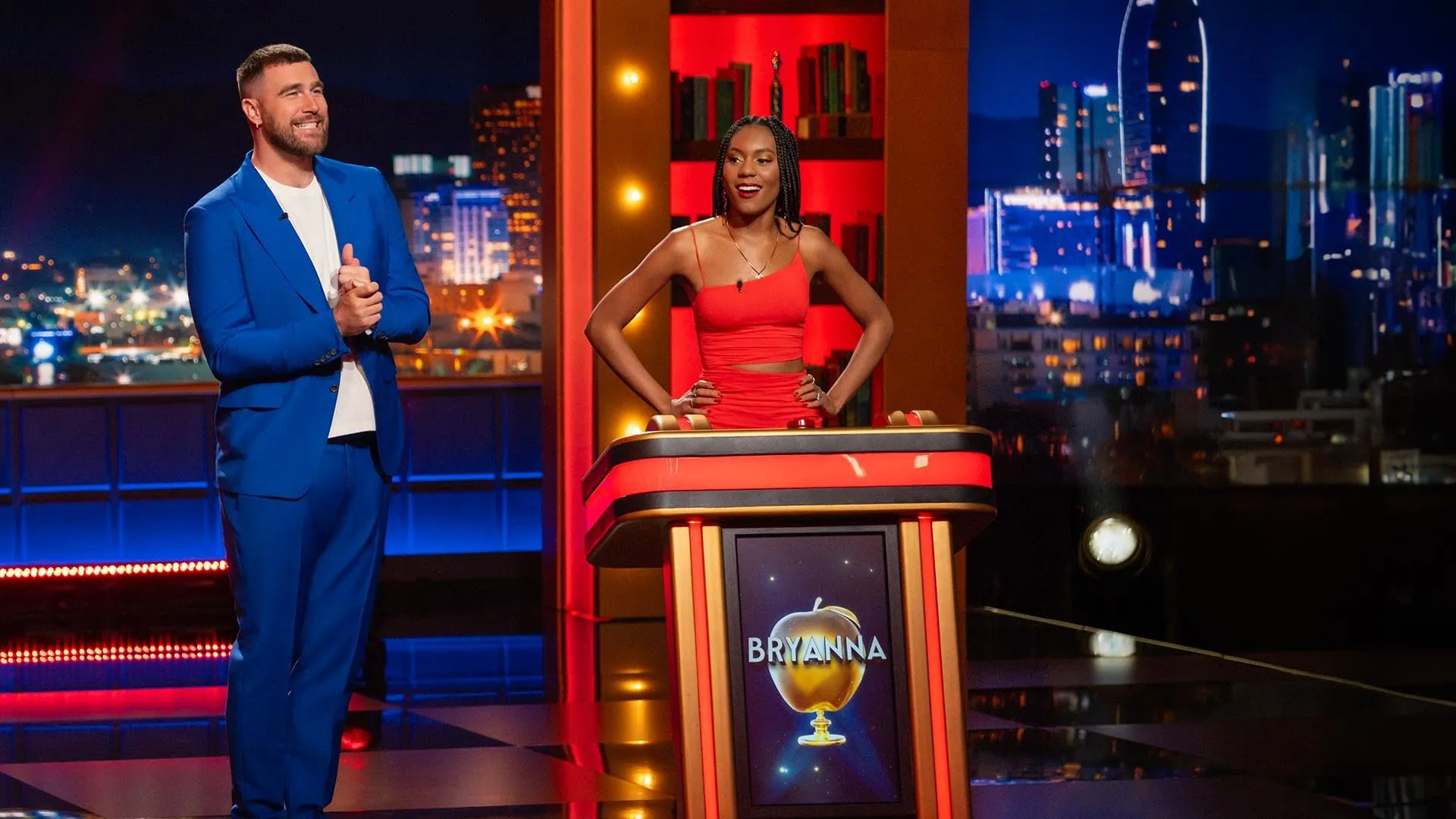Replacing the young contestants with celebrities, “Are You Smarter Than a Celebrity?” cleverly reimagines its predecessor. At its core, the show is still about answering simple questions, but the unpredictable nature of its famous guests adds a sense of humor. This change not only entertains but also reflects how obsessed we are with celebrity culture.
Ten questions cover a range of grade levels, and the game’s goal is for contestants to move up a money ladder from $1,000 to $50,000. They get help from a changing group of five celebrities, who provide both comic relief and strategic advice. The inclusion of “cheats” like “Peek” and “Pop Quiz” creates a dynamic interaction that enhances the viewing experience.
The bright set design visually evokes late-night talk shows, luring viewers into a lively environment. Overall, the show captures the essence of how people watch TV today, blending competition with teamwork and reflecting our interest in celebrity and knowledge.
Hosting with Charisma: Travis Kelce’s Performance
With an unmistakable charisma that elevates the show, Travis Kelce takes on the role of host for “Are You Smarter Than a Celebrity?” His ability to interact with contestants feels real and friendly, reminiscent of an experienced performer who knows how to connect with his audience.
Kelce’s background as a professional athlete and his recent work in entertainment gives him a unique view that lets him connect with contestants on a human level. His enthusiasm spreads throughout the room, and he easily handles the awkward moments, keeping the mood light and enjoyable.
Kelce’s sense of humor is especially impressive. In his interactions with the celebrity panel, he is especially good at making funny asides and lighthearted chatter. As viewers watch the chemistry between him and the stars, this dynamic adds another layer of entertainment.
His ability to go from funny to tense moments, like when contestants are asked tough questions, shows that he is versatile, which is a must for a good game show host. It’s reminiscent of the easy charm that someone like Noah Baumbach adds to his character-driven stories, where humor and depth live together in peace.
Kelce brings something different to the role compared to other hosts like Jeff Foxworthy and John Cena. While Cena’s larger-than-life persona gave the show a sense of theatricality, Foxworthy had a laid-back, country charm that drew a broad audience.
Kelce, on the other hand, manages to blend these styles, creating a modern host who is both friendly and dynamic. In today’s culture, where viewers value authenticity and the ability to relate, his presence seems especially relevant. He represents a new breed of hosts who aren’t just there to ask questions but to create a fun environment that draws the audience in.
Celebrity Participation: Stars in the Spotlight
Celebrities play a bigger role in “Are You Smarter Than a Celebrity?” than just being famous; they play an important part in the gameplay and the experience. For the contestants, each celebrity is like a lifeline; they help them answer several simple questions.
This show not only adds a layer of humor but also keeps viewers interested by showing off the celebrities’ personalities in a fun, often self-deprecating way. These stars create an environment of camaraderie rather than fighting against the contestants, blurring the lines between fame and everyday knowledge.
The inclusion of “cheats” like “Peek” and “Pop Quiz” enriches the gameplay further. Thanks to these mechanics, contestants can use celebrity knowledge, creating tension and excitement moments. It is smart for a contestant to “Peek” at a celebrity’s answer, which raises the stakes. Characters in independent films often work together to solve problems, and this playful interaction is reminiscent of the group action in films by directors like Greta Gerwig.
As far as entertainment goes, the celebrity panel adds a lot of life to the show and keeps it going. There are real moments of humor when celebrities share personal stories or are honest about how they don’t know how to answer the questions.
For example, Ron Funches’ comedic timing is at its best when he playfully struggles with childhood memories. Nikki Glaser’s sharp commentary resonates with both contestants and viewers like a charm. These interactions make the show more than just a quiz; they make it a show about celebrity personality and action.
Moments that stand out, like a celebrity mispronouncing a simple word or jokingly debating the pros and cons of their school days, create a relatable atmosphere that encourages the audience to laugh. In a world of carefully curated online personas, this blend of humor and vulnerability entertains and reflects a societal shift toward celebrating flaws. “Are You Smarter Than a Celebrity?” does a great job of making its celebrity contestants seem like real people, which reminds us that everyone, even famous people, has moments of doubt and silliness.
Pacing and Episode Length: The Rhythm of “Are You Smarter Than a Celebrity?”
Within its 40-minute show structure, “Are You Smarter Than a Celebrity?” ‘s pacing ‘s pacing is an interesting study of how speed can affect viewer engagement. Each show moves along slowly, giving contestants opportunities for reflection and storytelling.
This slow progression can sometimes feel drawn out, especially during segments where contestants talk more about their thoughts or personal stories. In a game show format where quick, dynamic exchanges are expected, these moments can add depth and risk losing the audience’s attention.
This slower rhythm could signify a larger culture shift toward more laid-back viewing experiences reminiscent of the character-driven stories found in modern independent movies. Consider Noah Baumbach’s films, where the pacing is conversational and encourages viewers to connect with the characters more closely.
Nevertheless, this method can create a disconnect in a game show setting if it is not adjusted well. Maintaining a sense of urgency while letting contestants show off their personalities and weaknesses is difficult.
There are good and bad things about this pacing for contestants. On the one hand, it gives them a chance to shine by telling stories and thinking about things as they try to answer questions. The lengthy segments, on the other hand, might create anxiety, especially as they get closer to questions with more at stake.
As viewers, we become invested in their journeys, but the slow burn can occasionally feel like a missed chance to increase the excitement. The pacing helps characters grow but needs a tighter structure to keep the audience and contestants interested.
Set Design and Production Quality: Crafting the Visual Experience
The set design of “Are You Smarter Than a Celebrity?” reminds me of the clean lines of late-night talk shows, creating a warm and welcoming environment that draws viewers in. Bright colors, plush seating for celebrities, and dynamic lighting create a lively background for the action. This choice of design not only enhances the show’s visual appeal but also maintains its playful atmosphere, where fun and competition coexist.
Excellent attention to detail in terms of the quality of the production. The editing and smooth transitions between segments help keep a rhythm that keeps the audience interested. Sound design, from the audience’s applause to the lighthearted musical cues, enriches the viewing experience by creating a sense of excitement and anticipation similar to the best moments of French New Wave cinema, where atmosphere plays a key role in storytelling.
This well-thought-out set design makes the audience much more interested. It encourages viewers to invest in the contestants’ journeys by fostering a friendly, happy atmosphere. The talk show format is familiar, allowing viewers to unwind and enjoy a sense of community while cheering for their favorite contestants and enjoying the banter between celebrities. Finally, how the show looks improves its entertainment value and emotional impact, making viewers want to join in on the fun.
Target Audience and Appeal: A Family-Friendly Experience
“Are You Smarter Than a Celebrity?” is a fun choice for viewers of all ages. It presents itself as a family-friendly show. Both young and older audiences are encouraged to participate in the action by its lighthearted format and humorous celebrity interviews.
Fostering a shared experience that promotes learning through laughing, parents can watch with their kids in comfort. Families looking for family-friendly programming are particularly drawn to the show because of its ability to combine educational material with fun.
Thanks to the blend of celebrities, from actors to sports, there is something for everyone in terms of demographic appeal. This diverse lineup draws fans of these stars and younger viewers, creating a generational bridge. The humor is approachable without oversimplifying, making it enjoyable for adults while still interesting for kids.
Overall, the show offers a lot of entertainment value, especially for casual viewers. It maintains a light pace that keeps the audience interested without being too much, striking a balance between competition and comedy. Each show feels like a mini-event, and the unpredictable celebrity reactions add an extra layer of excitement. “Are You Smarter Than a Celebrity?” is a standout choice for family viewing, appealing to those wanting fun and knowledge.
Comparative Analysis: A New Take on Familiar Grounds
Similarities in format can be seen between “Are You Smarter Than a Celebrity?” and its predecessor, “Are You Smarter Than a 5th Grader?” but the tone difference is very noticeable. Adding celebrities in the more recent format adds a layer of whimsy and unpredictability.
Both shows feature contestants answering simple questions. The current show’s celebrity-driven dynamic infuse it with a playful energy that resonates with a wider audience, whereas “5th Grader” kept a more straightforward educational approach. This fun approach encourages people to work together, which sets it apart from the competitive edge that often characterized the one that came before it.
In the world of modern game shows, “Are You Smarter Than a Celebrity?” stands out with its own style. Unlike other forms that focus on high stakes or intense pressure, this show has a more laid-back and fun vibe.
It’s similar to the camaraderie of shows like “The Masked Singer,” where celebrity participation increases fan interest through humor and personality. However, it also stands out from standard quiz shows like “Jeopardy!” or “Wheel of Fortune,” which are more about individual knowledge and competition than teamwork and fun.
Thanks to its blend of competition and lightheartedness, the show reflects current culture trends that value community and connection over fierce competition. It alludes to a generational shift in which celebrity culture has enhanced entertainment, allowing audiences to enjoy the show while reflecting on the ridiculousness of knowledge. The result is a modern and relevant show, capturing the spirit of the times while still entertaining and involving viewers in new ways.
The Review
Are You Smarter Than a Celebrity?
"Are You Smarter Than a Celebrity?" manages to blend humor, celebrity charm, and educational entertainment well, making it a great show for the whole family to watch. While the slow pacing enables character moments that improve audience connection, its lively set design and interesting format promote a sense of community. It might not always keep the stakes high, but its playful tone and relatable material fit well with today's culture. Overall, it is a unique take on the game show format, appealing to casual viewers and die-hard fans.
PROS
- Engaging celebrity interactions add humor and charm.
- Family-friendly content suitable for all ages.
- Relaxed atmosphere fosters viewer connection.
- Educational elements presented in an entertaining way.
- High production quality and vibrant set design.
CONS
- Slow pacing may risk losing viewer interest.
- Less competitive tension compared to traditional game shows.





















































